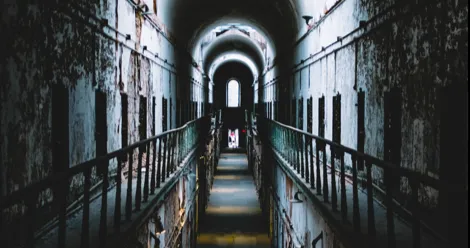
Attica! Attica! Attica: 20 Books About the Prison Industrial Complex
This content contains affiliate links. When you buy through these links, we may earn an affiliate commission.
It was an article on Mother Jones about a journalist’s undercover experience at a for-profit prison that opened my eyes to the desperate need for prison reform. I was outraged and disgusted… mostly at myself for having never thought about the human rights violations occurring behind those fortified walls. Or the money being made off of those human rights violations. A combination of greed, lack of training, and sheer disrespect for human life have coalesced to give us a prison system that has nothing to do with redemption and rehabilitation and has everything to do with power and domination.
And with the presentation of the Pulitzer award in History to Heather Ann Thompson for her comprehensive insight into the tragic events that unfolded on September 13, 1971 in Attica, New York, I hope attention is called to just how broken this system is. How for decades it has created utter chaos and destruction of entire communities. How the nature of the system causes it to prey exclusively on certain demographics. How the uprising at Attica and the elements that caused it are still occurring at correctional facilities all across the United States.
To this end, I have compiled a list of books that discuss the corrupt nature of the prison industrial complex, the need for reform, and the history of the abuses that have taken place inside so many yards of barbed wire.
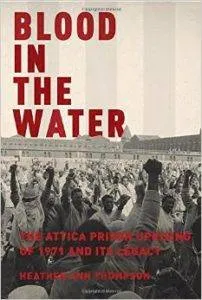 Blood in the Water: The Attica Prison Uprising of 1971 and Its Legacy by Heather Ann Thompson
Drawing from more than a decade of extensive research, historian Heather Ann Thompson sheds new light on every aspect of the uprising and its legacy, giving voice to all those who took part in this forty-five-year fight for justice: prisoners, former hostages, families of the victims, lawyers and judges, and state officials and members of law enforcement. Blood in the Water is the searing and indelible account of one of the most important civil rights stories of the last century.
Blood in the Water: The Attica Prison Uprising of 1971 and Its Legacy by Heather Ann Thompson
Drawing from more than a decade of extensive research, historian Heather Ann Thompson sheds new light on every aspect of the uprising and its legacy, giving voice to all those who took part in this forty-five-year fight for justice: prisoners, former hostages, families of the victims, lawyers and judges, and state officials and members of law enforcement. Blood in the Water is the searing and indelible account of one of the most important civil rights stories of the last century.
 The New Jim Crow: Mass Incarceration in the Age of Colorblindness by Michelle Alexander
Once in a great while a book comes along that changes the way we see the world and helps to fuel a nationwide social movement. The New Jim Crow is such a book. Praised by Harvard Law professor Lani Guinier as “brave and bold,” this book directly challenges the notion that the election of Barack Obama signals a new era of colorblindness. With dazzling candor, legal scholar Michelle Alexander argues that “we have not ended racial caste in America; we have merely redesigned it.” By targeting black men through the War on Drugs and decimating communities of color, the U.S. criminal justice system functions as a contemporary system of racial control—relegating millions to a permanent second-class status—even as it formally adheres to the principle of colorblindness. In the words of Benjamin Todd Jealous, president and CEO of the NAACP, this book is a “call to action.”
The New Jim Crow: Mass Incarceration in the Age of Colorblindness by Michelle Alexander
Once in a great while a book comes along that changes the way we see the world and helps to fuel a nationwide social movement. The New Jim Crow is such a book. Praised by Harvard Law professor Lani Guinier as “brave and bold,” this book directly challenges the notion that the election of Barack Obama signals a new era of colorblindness. With dazzling candor, legal scholar Michelle Alexander argues that “we have not ended racial caste in America; we have merely redesigned it.” By targeting black men through the War on Drugs and decimating communities of color, the U.S. criminal justice system functions as a contemporary system of racial control—relegating millions to a permanent second-class status—even as it formally adheres to the principle of colorblindness. In the words of Benjamin Todd Jealous, president and CEO of the NAACP, this book is a “call to action.”
 Are Prisons Obsolete? by Angela Y. Davis
With her characteristic brilliance, grace and radical audacity, Angela Y. Davis has put the case for the latest abolition movement in American life: the abolition of the prison. As she quite correctly notes, American life is replete with abolition movements, and when they were engaged in these struggles, their chances of success seemed almost unthinkable. For generations of Americans, the abolition of slavery was sheerest illusion. Similarly, the entrenched system of racial segregation seemed to last forever, and generations lived in the midst of the practice, with few predicting its passage from custom. The brutal, exploitative (dare one say lucrative?) convict-lease system that succeeded formal slavery reaped millions to southern jurisdictions (and untold miseries for tens of thousands of men, and women). Few predicted its passing from the American penal landscape. Davis expertly argues how social movements transformed these social, political and cultural institutions, and made such practices untenable.
Are Prisons Obsolete? by Angela Y. Davis
With her characteristic brilliance, grace and radical audacity, Angela Y. Davis has put the case for the latest abolition movement in American life: the abolition of the prison. As she quite correctly notes, American life is replete with abolition movements, and when they were engaged in these struggles, their chances of success seemed almost unthinkable. For generations of Americans, the abolition of slavery was sheerest illusion. Similarly, the entrenched system of racial segregation seemed to last forever, and generations lived in the midst of the practice, with few predicting its passage from custom. The brutal, exploitative (dare one say lucrative?) convict-lease system that succeeded formal slavery reaped millions to southern jurisdictions (and untold miseries for tens of thousands of men, and women). Few predicted its passing from the American penal landscape. Davis expertly argues how social movements transformed these social, political and cultural institutions, and made such practices untenable.
 Locking Up Our Own: Crime and Punishment in Black America by James Forman Jr.
In recent years, America’s criminal justice system has become the subject of an increasingly urgent debate. Critics have assailed the rise of mass incarceration, emphasizing its disproportionate impact on people of color. As James Forman, Jr., points out, however, the war on crime that began in the 1970s was supported by many African American leaders in the nation’s urban centers. In Locking Up Our Own, he seeks to understand why.
Locking Up Our Own: Crime and Punishment in Black America by James Forman Jr.
In recent years, America’s criminal justice system has become the subject of an increasingly urgent debate. Critics have assailed the rise of mass incarceration, emphasizing its disproportionate impact on people of color. As James Forman, Jr., points out, however, the war on crime that began in the 1970s was supported by many African American leaders in the nation’s urban centers. In Locking Up Our Own, he seeks to understand why.
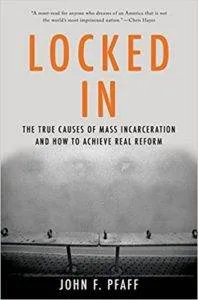 Locked In: The True Causes of Mass Incarceration- and How to Achieve True Reform by John Pfaff
Locked In is a revelatory investigation into the root causes of mass incarceration by one of the most exciting scholars in the country. Having spent fifteen years studying the data on imprisonment, John Pfaff takes apart the reigning consensus created by Michelle Alexander and other reformers, revealing that the most widely accepted explanations–the failed War on Drugs, draconian sentencing laws, an increasing reliance on private prisons–tell us much less than we think. Pfaff urges us to look at other factors instead, including a major shift in prosecutor behavior that occurred in the mid-1990s, when prosecutors began bringing felony charges against arrestees about twice as often as they had before. He describes a fractured criminal justice system, in which counties don’t pay for the people they send to state prisons, and in which white suburbs set law and order agendas for more-heavily minority cities. And he shows that if we hope to significantly reduce prison populations, we have no choice but to think differently about how to deal with people convicted of violent crimes–and why some people are violent in the first place.
Locked In: The True Causes of Mass Incarceration- and How to Achieve True Reform by John Pfaff
Locked In is a revelatory investigation into the root causes of mass incarceration by one of the most exciting scholars in the country. Having spent fifteen years studying the data on imprisonment, John Pfaff takes apart the reigning consensus created by Michelle Alexander and other reformers, revealing that the most widely accepted explanations–the failed War on Drugs, draconian sentencing laws, an increasing reliance on private prisons–tell us much less than we think. Pfaff urges us to look at other factors instead, including a major shift in prosecutor behavior that occurred in the mid-1990s, when prosecutors began bringing felony charges against arrestees about twice as often as they had before. He describes a fractured criminal justice system, in which counties don’t pay for the people they send to state prisons, and in which white suburbs set law and order agendas for more-heavily minority cities. And he shows that if we hope to significantly reduce prison populations, we have no choice but to think differently about how to deal with people convicted of violent crimes–and why some people are violent in the first place.
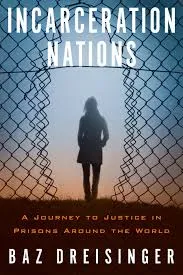 Incarceration Nations: A Journey to Justice in Prisons Around the World by Baz Dreisinger
Beginning in Africa and ending in Europe, Incarceration Nations is a first-person odyssey through the prison systems of the world. Professor, journalist, and founder of the Prison-to-College-Pipeline, Dreisinger looks into the human stories of incarcerated men and women and those who imprison them, creating a jarring, poignant view of a world to which most are denied access, and a rethinking of one of America’s most far-reaching global exports: the modern prison complex.
Incarceration Nations: A Journey to Justice in Prisons Around the World by Baz Dreisinger
Beginning in Africa and ending in Europe, Incarceration Nations is a first-person odyssey through the prison systems of the world. Professor, journalist, and founder of the Prison-to-College-Pipeline, Dreisinger looks into the human stories of incarcerated men and women and those who imprison them, creating a jarring, poignant view of a world to which most are denied access, and a rethinking of one of America’s most far-reaching global exports: the modern prison complex.
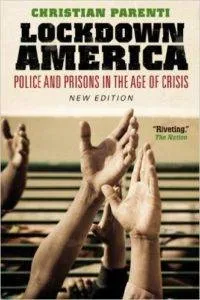 Lockdown America: Police and Prisons in the Age of Crisis by Christian Parenti
Why is criminal justice so central to American politics? Lockdown America not only documents the horrors and absurdities of militarized policing,prisons, a fortified border, and the federalization of the war on crime, it also explains the political and economic history behind the massive crackdown. This updated edition includes an afterword on the War on Terror, a meditation on surveillance and the specter of terrorism as they help reanimate the criminal justice attack. Written in vivid prose, Lockdown America will propel readers toward a deeper understanding of the links between crime and politics in a period of gathering economic crisis.
Lockdown America: Police and Prisons in the Age of Crisis by Christian Parenti
Why is criminal justice so central to American politics? Lockdown America not only documents the horrors and absurdities of militarized policing,prisons, a fortified border, and the federalization of the war on crime, it also explains the political and economic history behind the massive crackdown. This updated edition includes an afterword on the War on Terror, a meditation on surveillance and the specter of terrorism as they help reanimate the criminal justice attack. Written in vivid prose, Lockdown America will propel readers toward a deeper understanding of the links between crime and politics in a period of gathering economic crisis.
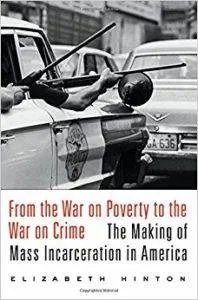 From the War on Poverty to the War on Crime: The Making of Mass Incarceration in America by Elizabeth Hinton
In the United States today, one in every thirty-one adults is under some form of penal control, including one in eleven African American men. How did the “land of the free” become the home of the world’s largest prison system? Challenging the belief that America’s prison problem originated with the Reagan administration’s War on Drugs, Elizabeth Hinton traces the rise of mass incarceration to an ironic source: the social welfare programs of Lyndon Johnson’s Great Society at the height of the civil rights era.
From the War on Poverty to the War on Crime: The Making of Mass Incarceration in America by Elizabeth Hinton
In the United States today, one in every thirty-one adults is under some form of penal control, including one in eleven African American men. How did the “land of the free” become the home of the world’s largest prison system? Challenging the belief that America’s prison problem originated with the Reagan administration’s War on Drugs, Elizabeth Hinton traces the rise of mass incarceration to an ironic source: the social welfare programs of Lyndon Johnson’s Great Society at the height of the civil rights era.
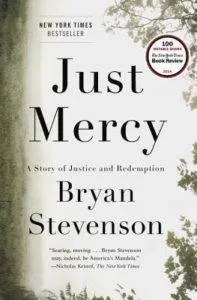 Just Mercy: A Story of Justice and Redemption by Bryan Stevenson
Bryan Stevenson was a young lawyer when he founded the Equal Justice Initiative, a legal practice dedicated to defending those most desperate and in need: the poor, the wrongly condemned, and women and children trapped in the farthest reaches of our criminal justice system. One of his first cases was that of Walter McMillian, a young man who was sentenced to die for a notorious murder he insisted he didn’t commit. The case drew Bryan into a tangle of conspiracy, political machination, and legal brinksmanship—and transformed his understanding of mercy and justice forever.
Just Mercy: A Story of Justice and Redemption by Bryan Stevenson
Bryan Stevenson was a young lawyer when he founded the Equal Justice Initiative, a legal practice dedicated to defending those most desperate and in need: the poor, the wrongly condemned, and women and children trapped in the farthest reaches of our criminal justice system. One of his first cases was that of Walter McMillian, a young man who was sentenced to die for a notorious murder he insisted he didn’t commit. The case drew Bryan into a tangle of conspiracy, political machination, and legal brinksmanship—and transformed his understanding of mercy and justice forever.
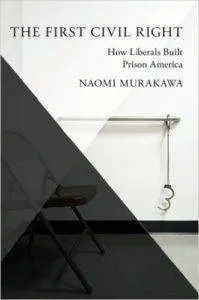 The First Civil Right: How Liberals Built Prison America by Naomi Murakawa
Murakawa traces the development of the modern American prison system through several presidencies, both Republican and Democrat. Responding to calls to end the lawlessness and violence against blacks at the state and local levels, the Truman administration expanded the scope of what was previously a weak federal system. Later administrations from Johnson to Clinton expanded the federal presence even more. Ironically, these steps laid the groundwork for the creation of the vast penal archipelago that now exists in the United States. What began as a liberal initiative to curb the mob violence and police brutality that had deprived racial minorities of their ‘first civil right-physical safety-eventually evolved into the federal correctional system that now deprives them, in unjustly large numbers, of another important right: freedom. The First Civil Right is a groundbreaking analysis of root of the conflicts that lie at the intersection of race and the legal system in America.
The First Civil Right: How Liberals Built Prison America by Naomi Murakawa
Murakawa traces the development of the modern American prison system through several presidencies, both Republican and Democrat. Responding to calls to end the lawlessness and violence against blacks at the state and local levels, the Truman administration expanded the scope of what was previously a weak federal system. Later administrations from Johnson to Clinton expanded the federal presence even more. Ironically, these steps laid the groundwork for the creation of the vast penal archipelago that now exists in the United States. What began as a liberal initiative to curb the mob violence and police brutality that had deprived racial minorities of their ‘first civil right-physical safety-eventually evolved into the federal correctional system that now deprives them, in unjustly large numbers, of another important right: freedom. The First Civil Right is a groundbreaking analysis of root of the conflicts that lie at the intersection of race and the legal system in America.
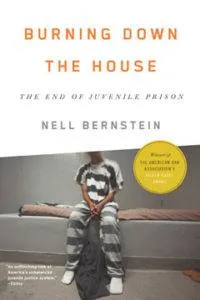 Burning Down the House: The End of Juvenile Prison by Nell Bernstein
In what the San Francisco Chronicle called “an epic work of investigative journalism that lays bare our nation’s brutal and counterproductive juvenile prisons and is a clarion call to bring our children home,” Nell Bernstein eloquently argues that there is no good way to lock up a child. Making the radical argument that state-run detention centers should be abolished completely, her “passionate and convincing” (Kirkus) book points out that our system of juvenile justice flies in the face of everything we know about what motivates young people to change.
Burning Down the House: The End of Juvenile Prison by Nell Bernstein
In what the San Francisco Chronicle called “an epic work of investigative journalism that lays bare our nation’s brutal and counterproductive juvenile prisons and is a clarion call to bring our children home,” Nell Bernstein eloquently argues that there is no good way to lock up a child. Making the radical argument that state-run detention centers should be abolished completely, her “passionate and convincing” (Kirkus) book points out that our system of juvenile justice flies in the face of everything we know about what motivates young people to change.
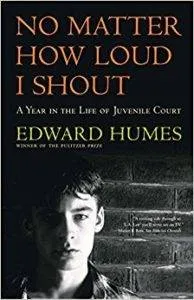 No Matter How Loud I Shout: A Year in the Life of Juvenile Court by Edward Humes
Weaving together a poignant, compelling narrative with razor-sharp investigative reporting, No Matter How Loud I Shout is a convincingly reported, profoundly disturbing discussion of the Los Angeles juvenile court’s failings, providing terrifying evidence of the system’s inability to slow juvenile crime or to make even a reasonable stab at rehabilitating troubled young offenders. Humes draws an alarming portrait of a judicial system in disarray.
No Matter How Loud I Shout: A Year in the Life of Juvenile Court by Edward Humes
Weaving together a poignant, compelling narrative with razor-sharp investigative reporting, No Matter How Loud I Shout is a convincingly reported, profoundly disturbing discussion of the Los Angeles juvenile court’s failings, providing terrifying evidence of the system’s inability to slow juvenile crime or to make even a reasonable stab at rehabilitating troubled young offenders. Humes draws an alarming portrait of a judicial system in disarray.
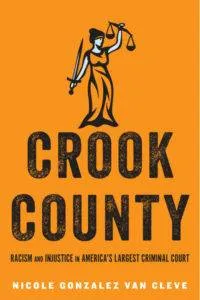 Crook County: Racism and Injustice in America’s Criminal Courts by Nicole Gonzalez Van Cleve
Crook County‘s powerful and at times devastating narratives reveal startling truths about a legal culture steeped in racial abuse. Defendants find themselves thrust into a pernicious legal world where courtroom actors live and breathe racism while simultaneously committing themselves to a colorblind ideal. Gonzalez Van Cleve urges all citizens to take a closer look at the way we do justice in America and to hold our arbiters of justice accountable to the highest standards of equality.
Crook County: Racism and Injustice in America’s Criminal Courts by Nicole Gonzalez Van Cleve
Crook County‘s powerful and at times devastating narratives reveal startling truths about a legal culture steeped in racial abuse. Defendants find themselves thrust into a pernicious legal world where courtroom actors live and breathe racism while simultaneously committing themselves to a colorblind ideal. Gonzalez Van Cleve urges all citizens to take a closer look at the way we do justice in America and to hold our arbiters of justice accountable to the highest standards of equality.
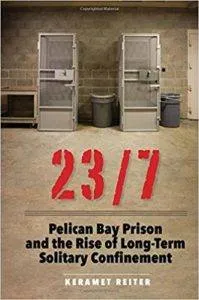 23/7: Pelican Bay Prison and the Rise of Long-Term Solitary Confinement by Keramet Reiter
Originally meant to be brief and exceptional, solitary confinement in U.S. prisons has become long-term and common. Prisoners spend twenty-three hours a day they are held entirely at administrators’ discretion. Keramet Reiter tells the history of one “supermax,” California’s Pelican Bay State Prison, whose extreme conditions recently sparked a statewide hunger strike by 30,000 prisoners. This book describes how Pelican Bay was created without legislative oversight, in fearful response to 1970s radicals; how easily prisoners slip into solitary; and the mental havoc and social costs of years and decades in isolation. The product of fifteen years of research in and about prisons, this book provides essential background to a subject now drawing national attention.
23/7: Pelican Bay Prison and the Rise of Long-Term Solitary Confinement by Keramet Reiter
Originally meant to be brief and exceptional, solitary confinement in U.S. prisons has become long-term and common. Prisoners spend twenty-three hours a day they are held entirely at administrators’ discretion. Keramet Reiter tells the history of one “supermax,” California’s Pelican Bay State Prison, whose extreme conditions recently sparked a statewide hunger strike by 30,000 prisoners. This book describes how Pelican Bay was created without legislative oversight, in fearful response to 1970s radicals; how easily prisoners slip into solitary; and the mental havoc and social costs of years and decades in isolation. The product of fifteen years of research in and about prisons, this book provides essential background to a subject now drawing national attention.
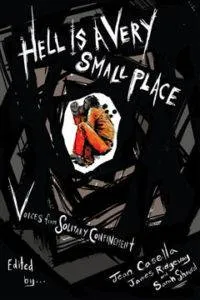 Hell is a Very Small Place: Voices from Solitary Confinement edited by Jean Casella, James Ridgeway, and Sarah Shourd
The UN Special Rapporteur on Torture has denounced the use of solitary confinement beyond fifteen days as a form of cruel and degrading treatment that often rises to the level of torture. Yet the United States holds more than eighty thousand people in isolation on any given day. Now sixteen authors vividly describe the miserable realities of life in solitary.
Hell is a Very Small Place: Voices from Solitary Confinement edited by Jean Casella, James Ridgeway, and Sarah Shourd
The UN Special Rapporteur on Torture has denounced the use of solitary confinement beyond fifteen days as a form of cruel and degrading treatment that often rises to the level of torture. Yet the United States holds more than eighty thousand people in isolation on any given day. Now sixteen authors vividly describe the miserable realities of life in solitary.
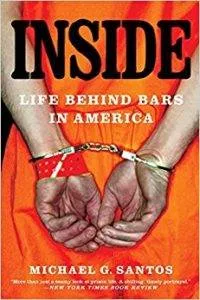 Inside: Life Behind Bars in America by Michael G. Santos
Capturing the voices of his fellow prisoners with perfect pitch, Santos makes the tragic―and at times inspiring―stories of men from the toughest gang leaders to the richest Wall Street criminals come alive. From drug schemes, murders for hire, and even a prostitution ring that trades on the flesh of female prison guards, this book contains the never-before-seen details of prison life that at last illuminate the varied ways in which men experience life behind bars in America.
Inside: Life Behind Bars in America by Michael G. Santos
Capturing the voices of his fellow prisoners with perfect pitch, Santos makes the tragic―and at times inspiring―stories of men from the toughest gang leaders to the richest Wall Street criminals come alive. From drug schemes, murders for hire, and even a prostitution ring that trades on the flesh of female prison guards, this book contains the never-before-seen details of prison life that at last illuminate the varied ways in which men experience life behind bars in America.
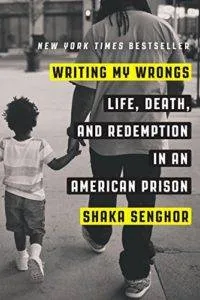 Writing My Wrongs: Life, Death, and Redemption in an American Prison by Shaka Senghor
In equal turns, Writing My Wrongs is a page-turning portrait of life in the shadow of poverty, violence, and fear; an unforgettable story of redemption, reminding us that our worst deeds don’t define us; and a compelling witness to our country’s need for rethinking its approach to crime, prison, and the men and women sent there.
Writing My Wrongs: Life, Death, and Redemption in an American Prison by Shaka Senghor
In equal turns, Writing My Wrongs is a page-turning portrait of life in the shadow of poverty, violence, and fear; an unforgettable story of redemption, reminding us that our worst deeds don’t define us; and a compelling witness to our country’s need for rethinking its approach to crime, prison, and the men and women sent there.
 A World Apart: Women, Prison, and Life Behind Bars by Cristina Rathbone
At the center of the book is Denise, a mother serving five years for a first-time, nonviolent drug offense. Denise’s son is nine and obsessed with Beanie Babies when she first arrives in prison. He is fourteen and in prison himself by the time she is finally released. As Denise struggles to reconcile life in prison with the realities of her son’s excessive freedom on the outside, we meet women like Julie, who gets through her time by distracting herself with flirtatious, often salacious relationships with male correctional officers; Louise, who keeps herself going by selling makeup and personalized food packages on the prison black market; Chris, whose mental illness leads her to kill herself in prison; and Susan, who, after thirteen years of intermittent incarceration, has come to think of MCI-Framingham as home. Fearlessly truthful and revelatory, A World Apart is a major work of investigative journalism and social justice.
A World Apart: Women, Prison, and Life Behind Bars by Cristina Rathbone
At the center of the book is Denise, a mother serving five years for a first-time, nonviolent drug offense. Denise’s son is nine and obsessed with Beanie Babies when she first arrives in prison. He is fourteen and in prison himself by the time she is finally released. As Denise struggles to reconcile life in prison with the realities of her son’s excessive freedom on the outside, we meet women like Julie, who gets through her time by distracting herself with flirtatious, often salacious relationships with male correctional officers; Louise, who keeps herself going by selling makeup and personalized food packages on the prison black market; Chris, whose mental illness leads her to kill herself in prison; and Susan, who, after thirteen years of intermittent incarceration, has come to think of MCI-Framingham as home. Fearlessly truthful and revelatory, A World Apart is a major work of investigative journalism and social justice.
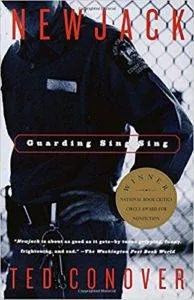 Newjack: Guarding Sing Sing by Ted Conover
As he struggles to become a good officer, Conover angers inmates, dodges blows, and attempts, in the face of overwhelming odds, to balance decency with toughness. Through his insights into the harsh culture of prison, the grueling and demeaning working conditions of the officers, and the unexpected ways the job encroaches on his own family life, we begin to see how our burgeoning prison system brutalizes everyone connected with it. An intimate portrait of a world few readers have ever experienced, Newjack is a haunting journey into a dark undercurrent of American life.
Newjack: Guarding Sing Sing by Ted Conover
As he struggles to become a good officer, Conover angers inmates, dodges blows, and attempts, in the face of overwhelming odds, to balance decency with toughness. Through his insights into the harsh culture of prison, the grueling and demeaning working conditions of the officers, and the unexpected ways the job encroaches on his own family life, we begin to see how our burgeoning prison system brutalizes everyone connected with it. An intimate portrait of a world few readers have ever experienced, Newjack is a haunting journey into a dark undercurrent of American life.
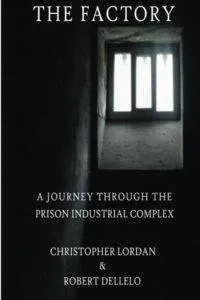 The Factory: A Journey Through the Prison Industrial Complex by Christopher Lordan and Robert Dellelo
Dellelo’s story is not just the story of one prisoner, but rather, the story of an industry whose success is dependent upon the continued failure of more than two million Americans. It is the story of an industry that built an assembly line that takes 13-year-old boys and transforms them into violent, habitual offenders, leaving both them and society as a whole to deal with the consequences of their dangerous product. Bobby Dellelo’s life experience is the story of that process. It is the story of The Factory.
The Factory: A Journey Through the Prison Industrial Complex by Christopher Lordan and Robert Dellelo
Dellelo’s story is not just the story of one prisoner, but rather, the story of an industry whose success is dependent upon the continued failure of more than two million Americans. It is the story of an industry that built an assembly line that takes 13-year-old boys and transforms them into violent, habitual offenders, leaving both them and society as a whole to deal with the consequences of their dangerous product. Bobby Dellelo’s life experience is the story of that process. It is the story of The Factory.
 Blood in the Water: The Attica Prison Uprising of 1971 and Its Legacy by Heather Ann Thompson
Drawing from more than a decade of extensive research, historian Heather Ann Thompson sheds new light on every aspect of the uprising and its legacy, giving voice to all those who took part in this forty-five-year fight for justice: prisoners, former hostages, families of the victims, lawyers and judges, and state officials and members of law enforcement. Blood in the Water is the searing and indelible account of one of the most important civil rights stories of the last century.
Blood in the Water: The Attica Prison Uprising of 1971 and Its Legacy by Heather Ann Thompson
Drawing from more than a decade of extensive research, historian Heather Ann Thompson sheds new light on every aspect of the uprising and its legacy, giving voice to all those who took part in this forty-five-year fight for justice: prisoners, former hostages, families of the victims, lawyers and judges, and state officials and members of law enforcement. Blood in the Water is the searing and indelible account of one of the most important civil rights stories of the last century.
 The New Jim Crow: Mass Incarceration in the Age of Colorblindness by Michelle Alexander
Once in a great while a book comes along that changes the way we see the world and helps to fuel a nationwide social movement. The New Jim Crow is such a book. Praised by Harvard Law professor Lani Guinier as “brave and bold,” this book directly challenges the notion that the election of Barack Obama signals a new era of colorblindness. With dazzling candor, legal scholar Michelle Alexander argues that “we have not ended racial caste in America; we have merely redesigned it.” By targeting black men through the War on Drugs and decimating communities of color, the U.S. criminal justice system functions as a contemporary system of racial control—relegating millions to a permanent second-class status—even as it formally adheres to the principle of colorblindness. In the words of Benjamin Todd Jealous, president and CEO of the NAACP, this book is a “call to action.”
The New Jim Crow: Mass Incarceration in the Age of Colorblindness by Michelle Alexander
Once in a great while a book comes along that changes the way we see the world and helps to fuel a nationwide social movement. The New Jim Crow is such a book. Praised by Harvard Law professor Lani Guinier as “brave and bold,” this book directly challenges the notion that the election of Barack Obama signals a new era of colorblindness. With dazzling candor, legal scholar Michelle Alexander argues that “we have not ended racial caste in America; we have merely redesigned it.” By targeting black men through the War on Drugs and decimating communities of color, the U.S. criminal justice system functions as a contemporary system of racial control—relegating millions to a permanent second-class status—even as it formally adheres to the principle of colorblindness. In the words of Benjamin Todd Jealous, president and CEO of the NAACP, this book is a “call to action.”
 Are Prisons Obsolete? by Angela Y. Davis
With her characteristic brilliance, grace and radical audacity, Angela Y. Davis has put the case for the latest abolition movement in American life: the abolition of the prison. As she quite correctly notes, American life is replete with abolition movements, and when they were engaged in these struggles, their chances of success seemed almost unthinkable. For generations of Americans, the abolition of slavery was sheerest illusion. Similarly, the entrenched system of racial segregation seemed to last forever, and generations lived in the midst of the practice, with few predicting its passage from custom. The brutal, exploitative (dare one say lucrative?) convict-lease system that succeeded formal slavery reaped millions to southern jurisdictions (and untold miseries for tens of thousands of men, and women). Few predicted its passing from the American penal landscape. Davis expertly argues how social movements transformed these social, political and cultural institutions, and made such practices untenable.
Are Prisons Obsolete? by Angela Y. Davis
With her characteristic brilliance, grace and radical audacity, Angela Y. Davis has put the case for the latest abolition movement in American life: the abolition of the prison. As she quite correctly notes, American life is replete with abolition movements, and when they were engaged in these struggles, their chances of success seemed almost unthinkable. For generations of Americans, the abolition of slavery was sheerest illusion. Similarly, the entrenched system of racial segregation seemed to last forever, and generations lived in the midst of the practice, with few predicting its passage from custom. The brutal, exploitative (dare one say lucrative?) convict-lease system that succeeded formal slavery reaped millions to southern jurisdictions (and untold miseries for tens of thousands of men, and women). Few predicted its passing from the American penal landscape. Davis expertly argues how social movements transformed these social, political and cultural institutions, and made such practices untenable.
 Locking Up Our Own: Crime and Punishment in Black America by James Forman Jr.
In recent years, America’s criminal justice system has become the subject of an increasingly urgent debate. Critics have assailed the rise of mass incarceration, emphasizing its disproportionate impact on people of color. As James Forman, Jr., points out, however, the war on crime that began in the 1970s was supported by many African American leaders in the nation’s urban centers. In Locking Up Our Own, he seeks to understand why.
Locking Up Our Own: Crime and Punishment in Black America by James Forman Jr.
In recent years, America’s criminal justice system has become the subject of an increasingly urgent debate. Critics have assailed the rise of mass incarceration, emphasizing its disproportionate impact on people of color. As James Forman, Jr., points out, however, the war on crime that began in the 1970s was supported by many African American leaders in the nation’s urban centers. In Locking Up Our Own, he seeks to understand why.
 Locked In: The True Causes of Mass Incarceration- and How to Achieve True Reform by John Pfaff
Locked In is a revelatory investigation into the root causes of mass incarceration by one of the most exciting scholars in the country. Having spent fifteen years studying the data on imprisonment, John Pfaff takes apart the reigning consensus created by Michelle Alexander and other reformers, revealing that the most widely accepted explanations–the failed War on Drugs, draconian sentencing laws, an increasing reliance on private prisons–tell us much less than we think. Pfaff urges us to look at other factors instead, including a major shift in prosecutor behavior that occurred in the mid-1990s, when prosecutors began bringing felony charges against arrestees about twice as often as they had before. He describes a fractured criminal justice system, in which counties don’t pay for the people they send to state prisons, and in which white suburbs set law and order agendas for more-heavily minority cities. And he shows that if we hope to significantly reduce prison populations, we have no choice but to think differently about how to deal with people convicted of violent crimes–and why some people are violent in the first place.
Locked In: The True Causes of Mass Incarceration- and How to Achieve True Reform by John Pfaff
Locked In is a revelatory investigation into the root causes of mass incarceration by one of the most exciting scholars in the country. Having spent fifteen years studying the data on imprisonment, John Pfaff takes apart the reigning consensus created by Michelle Alexander and other reformers, revealing that the most widely accepted explanations–the failed War on Drugs, draconian sentencing laws, an increasing reliance on private prisons–tell us much less than we think. Pfaff urges us to look at other factors instead, including a major shift in prosecutor behavior that occurred in the mid-1990s, when prosecutors began bringing felony charges against arrestees about twice as often as they had before. He describes a fractured criminal justice system, in which counties don’t pay for the people they send to state prisons, and in which white suburbs set law and order agendas for more-heavily minority cities. And he shows that if we hope to significantly reduce prison populations, we have no choice but to think differently about how to deal with people convicted of violent crimes–and why some people are violent in the first place.
 Incarceration Nations: A Journey to Justice in Prisons Around the World by Baz Dreisinger
Beginning in Africa and ending in Europe, Incarceration Nations is a first-person odyssey through the prison systems of the world. Professor, journalist, and founder of the Prison-to-College-Pipeline, Dreisinger looks into the human stories of incarcerated men and women and those who imprison them, creating a jarring, poignant view of a world to which most are denied access, and a rethinking of one of America’s most far-reaching global exports: the modern prison complex.
Incarceration Nations: A Journey to Justice in Prisons Around the World by Baz Dreisinger
Beginning in Africa and ending in Europe, Incarceration Nations is a first-person odyssey through the prison systems of the world. Professor, journalist, and founder of the Prison-to-College-Pipeline, Dreisinger looks into the human stories of incarcerated men and women and those who imprison them, creating a jarring, poignant view of a world to which most are denied access, and a rethinking of one of America’s most far-reaching global exports: the modern prison complex.
 Lockdown America: Police and Prisons in the Age of Crisis by Christian Parenti
Why is criminal justice so central to American politics? Lockdown America not only documents the horrors and absurdities of militarized policing,prisons, a fortified border, and the federalization of the war on crime, it also explains the political and economic history behind the massive crackdown. This updated edition includes an afterword on the War on Terror, a meditation on surveillance and the specter of terrorism as they help reanimate the criminal justice attack. Written in vivid prose, Lockdown America will propel readers toward a deeper understanding of the links between crime and politics in a period of gathering economic crisis.
Lockdown America: Police and Prisons in the Age of Crisis by Christian Parenti
Why is criminal justice so central to American politics? Lockdown America not only documents the horrors and absurdities of militarized policing,prisons, a fortified border, and the federalization of the war on crime, it also explains the political and economic history behind the massive crackdown. This updated edition includes an afterword on the War on Terror, a meditation on surveillance and the specter of terrorism as they help reanimate the criminal justice attack. Written in vivid prose, Lockdown America will propel readers toward a deeper understanding of the links between crime and politics in a period of gathering economic crisis.
 From the War on Poverty to the War on Crime: The Making of Mass Incarceration in America by Elizabeth Hinton
In the United States today, one in every thirty-one adults is under some form of penal control, including one in eleven African American men. How did the “land of the free” become the home of the world’s largest prison system? Challenging the belief that America’s prison problem originated with the Reagan administration’s War on Drugs, Elizabeth Hinton traces the rise of mass incarceration to an ironic source: the social welfare programs of Lyndon Johnson’s Great Society at the height of the civil rights era.
From the War on Poverty to the War on Crime: The Making of Mass Incarceration in America by Elizabeth Hinton
In the United States today, one in every thirty-one adults is under some form of penal control, including one in eleven African American men. How did the “land of the free” become the home of the world’s largest prison system? Challenging the belief that America’s prison problem originated with the Reagan administration’s War on Drugs, Elizabeth Hinton traces the rise of mass incarceration to an ironic source: the social welfare programs of Lyndon Johnson’s Great Society at the height of the civil rights era.
 Just Mercy: A Story of Justice and Redemption by Bryan Stevenson
Bryan Stevenson was a young lawyer when he founded the Equal Justice Initiative, a legal practice dedicated to defending those most desperate and in need: the poor, the wrongly condemned, and women and children trapped in the farthest reaches of our criminal justice system. One of his first cases was that of Walter McMillian, a young man who was sentenced to die for a notorious murder he insisted he didn’t commit. The case drew Bryan into a tangle of conspiracy, political machination, and legal brinksmanship—and transformed his understanding of mercy and justice forever.
Just Mercy: A Story of Justice and Redemption by Bryan Stevenson
Bryan Stevenson was a young lawyer when he founded the Equal Justice Initiative, a legal practice dedicated to defending those most desperate and in need: the poor, the wrongly condemned, and women and children trapped in the farthest reaches of our criminal justice system. One of his first cases was that of Walter McMillian, a young man who was sentenced to die for a notorious murder he insisted he didn’t commit. The case drew Bryan into a tangle of conspiracy, political machination, and legal brinksmanship—and transformed his understanding of mercy and justice forever.
 The First Civil Right: How Liberals Built Prison America by Naomi Murakawa
Murakawa traces the development of the modern American prison system through several presidencies, both Republican and Democrat. Responding to calls to end the lawlessness and violence against blacks at the state and local levels, the Truman administration expanded the scope of what was previously a weak federal system. Later administrations from Johnson to Clinton expanded the federal presence even more. Ironically, these steps laid the groundwork for the creation of the vast penal archipelago that now exists in the United States. What began as a liberal initiative to curb the mob violence and police brutality that had deprived racial minorities of their ‘first civil right-physical safety-eventually evolved into the federal correctional system that now deprives them, in unjustly large numbers, of another important right: freedom. The First Civil Right is a groundbreaking analysis of root of the conflicts that lie at the intersection of race and the legal system in America.
The First Civil Right: How Liberals Built Prison America by Naomi Murakawa
Murakawa traces the development of the modern American prison system through several presidencies, both Republican and Democrat. Responding to calls to end the lawlessness and violence against blacks at the state and local levels, the Truman administration expanded the scope of what was previously a weak federal system. Later administrations from Johnson to Clinton expanded the federal presence even more. Ironically, these steps laid the groundwork for the creation of the vast penal archipelago that now exists in the United States. What began as a liberal initiative to curb the mob violence and police brutality that had deprived racial minorities of their ‘first civil right-physical safety-eventually evolved into the federal correctional system that now deprives them, in unjustly large numbers, of another important right: freedom. The First Civil Right is a groundbreaking analysis of root of the conflicts that lie at the intersection of race and the legal system in America.
 Burning Down the House: The End of Juvenile Prison by Nell Bernstein
In what the San Francisco Chronicle called “an epic work of investigative journalism that lays bare our nation’s brutal and counterproductive juvenile prisons and is a clarion call to bring our children home,” Nell Bernstein eloquently argues that there is no good way to lock up a child. Making the radical argument that state-run detention centers should be abolished completely, her “passionate and convincing” (Kirkus) book points out that our system of juvenile justice flies in the face of everything we know about what motivates young people to change.
Burning Down the House: The End of Juvenile Prison by Nell Bernstein
In what the San Francisco Chronicle called “an epic work of investigative journalism that lays bare our nation’s brutal and counterproductive juvenile prisons and is a clarion call to bring our children home,” Nell Bernstein eloquently argues that there is no good way to lock up a child. Making the radical argument that state-run detention centers should be abolished completely, her “passionate and convincing” (Kirkus) book points out that our system of juvenile justice flies in the face of everything we know about what motivates young people to change.
 No Matter How Loud I Shout: A Year in the Life of Juvenile Court by Edward Humes
Weaving together a poignant, compelling narrative with razor-sharp investigative reporting, No Matter How Loud I Shout is a convincingly reported, profoundly disturbing discussion of the Los Angeles juvenile court’s failings, providing terrifying evidence of the system’s inability to slow juvenile crime or to make even a reasonable stab at rehabilitating troubled young offenders. Humes draws an alarming portrait of a judicial system in disarray.
No Matter How Loud I Shout: A Year in the Life of Juvenile Court by Edward Humes
Weaving together a poignant, compelling narrative with razor-sharp investigative reporting, No Matter How Loud I Shout is a convincingly reported, profoundly disturbing discussion of the Los Angeles juvenile court’s failings, providing terrifying evidence of the system’s inability to slow juvenile crime or to make even a reasonable stab at rehabilitating troubled young offenders. Humes draws an alarming portrait of a judicial system in disarray.
 Crook County: Racism and Injustice in America’s Criminal Courts by Nicole Gonzalez Van Cleve
Crook County‘s powerful and at times devastating narratives reveal startling truths about a legal culture steeped in racial abuse. Defendants find themselves thrust into a pernicious legal world where courtroom actors live and breathe racism while simultaneously committing themselves to a colorblind ideal. Gonzalez Van Cleve urges all citizens to take a closer look at the way we do justice in America and to hold our arbiters of justice accountable to the highest standards of equality.
Crook County: Racism and Injustice in America’s Criminal Courts by Nicole Gonzalez Van Cleve
Crook County‘s powerful and at times devastating narratives reveal startling truths about a legal culture steeped in racial abuse. Defendants find themselves thrust into a pernicious legal world where courtroom actors live and breathe racism while simultaneously committing themselves to a colorblind ideal. Gonzalez Van Cleve urges all citizens to take a closer look at the way we do justice in America and to hold our arbiters of justice accountable to the highest standards of equality.
 23/7: Pelican Bay Prison and the Rise of Long-Term Solitary Confinement by Keramet Reiter
Originally meant to be brief and exceptional, solitary confinement in U.S. prisons has become long-term and common. Prisoners spend twenty-three hours a day they are held entirely at administrators’ discretion. Keramet Reiter tells the history of one “supermax,” California’s Pelican Bay State Prison, whose extreme conditions recently sparked a statewide hunger strike by 30,000 prisoners. This book describes how Pelican Bay was created without legislative oversight, in fearful response to 1970s radicals; how easily prisoners slip into solitary; and the mental havoc and social costs of years and decades in isolation. The product of fifteen years of research in and about prisons, this book provides essential background to a subject now drawing national attention.
23/7: Pelican Bay Prison and the Rise of Long-Term Solitary Confinement by Keramet Reiter
Originally meant to be brief and exceptional, solitary confinement in U.S. prisons has become long-term and common. Prisoners spend twenty-three hours a day they are held entirely at administrators’ discretion. Keramet Reiter tells the history of one “supermax,” California’s Pelican Bay State Prison, whose extreme conditions recently sparked a statewide hunger strike by 30,000 prisoners. This book describes how Pelican Bay was created without legislative oversight, in fearful response to 1970s radicals; how easily prisoners slip into solitary; and the mental havoc and social costs of years and decades in isolation. The product of fifteen years of research in and about prisons, this book provides essential background to a subject now drawing national attention.
 Hell is a Very Small Place: Voices from Solitary Confinement edited by Jean Casella, James Ridgeway, and Sarah Shourd
The UN Special Rapporteur on Torture has denounced the use of solitary confinement beyond fifteen days as a form of cruel and degrading treatment that often rises to the level of torture. Yet the United States holds more than eighty thousand people in isolation on any given day. Now sixteen authors vividly describe the miserable realities of life in solitary.
Hell is a Very Small Place: Voices from Solitary Confinement edited by Jean Casella, James Ridgeway, and Sarah Shourd
The UN Special Rapporteur on Torture has denounced the use of solitary confinement beyond fifteen days as a form of cruel and degrading treatment that often rises to the level of torture. Yet the United States holds more than eighty thousand people in isolation on any given day. Now sixteen authors vividly describe the miserable realities of life in solitary.
 Inside: Life Behind Bars in America by Michael G. Santos
Capturing the voices of his fellow prisoners with perfect pitch, Santos makes the tragic―and at times inspiring―stories of men from the toughest gang leaders to the richest Wall Street criminals come alive. From drug schemes, murders for hire, and even a prostitution ring that trades on the flesh of female prison guards, this book contains the never-before-seen details of prison life that at last illuminate the varied ways in which men experience life behind bars in America.
Inside: Life Behind Bars in America by Michael G. Santos
Capturing the voices of his fellow prisoners with perfect pitch, Santos makes the tragic―and at times inspiring―stories of men from the toughest gang leaders to the richest Wall Street criminals come alive. From drug schemes, murders for hire, and even a prostitution ring that trades on the flesh of female prison guards, this book contains the never-before-seen details of prison life that at last illuminate the varied ways in which men experience life behind bars in America.
 Writing My Wrongs: Life, Death, and Redemption in an American Prison by Shaka Senghor
In equal turns, Writing My Wrongs is a page-turning portrait of life in the shadow of poverty, violence, and fear; an unforgettable story of redemption, reminding us that our worst deeds don’t define us; and a compelling witness to our country’s need for rethinking its approach to crime, prison, and the men and women sent there.
Writing My Wrongs: Life, Death, and Redemption in an American Prison by Shaka Senghor
In equal turns, Writing My Wrongs is a page-turning portrait of life in the shadow of poverty, violence, and fear; an unforgettable story of redemption, reminding us that our worst deeds don’t define us; and a compelling witness to our country’s need for rethinking its approach to crime, prison, and the men and women sent there.
 A World Apart: Women, Prison, and Life Behind Bars by Cristina Rathbone
At the center of the book is Denise, a mother serving five years for a first-time, nonviolent drug offense. Denise’s son is nine and obsessed with Beanie Babies when she first arrives in prison. He is fourteen and in prison himself by the time she is finally released. As Denise struggles to reconcile life in prison with the realities of her son’s excessive freedom on the outside, we meet women like Julie, who gets through her time by distracting herself with flirtatious, often salacious relationships with male correctional officers; Louise, who keeps herself going by selling makeup and personalized food packages on the prison black market; Chris, whose mental illness leads her to kill herself in prison; and Susan, who, after thirteen years of intermittent incarceration, has come to think of MCI-Framingham as home. Fearlessly truthful and revelatory, A World Apart is a major work of investigative journalism and social justice.
A World Apart: Women, Prison, and Life Behind Bars by Cristina Rathbone
At the center of the book is Denise, a mother serving five years for a first-time, nonviolent drug offense. Denise’s son is nine and obsessed with Beanie Babies when she first arrives in prison. He is fourteen and in prison himself by the time she is finally released. As Denise struggles to reconcile life in prison with the realities of her son’s excessive freedom on the outside, we meet women like Julie, who gets through her time by distracting herself with flirtatious, often salacious relationships with male correctional officers; Louise, who keeps herself going by selling makeup and personalized food packages on the prison black market; Chris, whose mental illness leads her to kill herself in prison; and Susan, who, after thirteen years of intermittent incarceration, has come to think of MCI-Framingham as home. Fearlessly truthful and revelatory, A World Apart is a major work of investigative journalism and social justice.
 Newjack: Guarding Sing Sing by Ted Conover
As he struggles to become a good officer, Conover angers inmates, dodges blows, and attempts, in the face of overwhelming odds, to balance decency with toughness. Through his insights into the harsh culture of prison, the grueling and demeaning working conditions of the officers, and the unexpected ways the job encroaches on his own family life, we begin to see how our burgeoning prison system brutalizes everyone connected with it. An intimate portrait of a world few readers have ever experienced, Newjack is a haunting journey into a dark undercurrent of American life.
Newjack: Guarding Sing Sing by Ted Conover
As he struggles to become a good officer, Conover angers inmates, dodges blows, and attempts, in the face of overwhelming odds, to balance decency with toughness. Through his insights into the harsh culture of prison, the grueling and demeaning working conditions of the officers, and the unexpected ways the job encroaches on his own family life, we begin to see how our burgeoning prison system brutalizes everyone connected with it. An intimate portrait of a world few readers have ever experienced, Newjack is a haunting journey into a dark undercurrent of American life.
 The Factory: A Journey Through the Prison Industrial Complex by Christopher Lordan and Robert Dellelo
Dellelo’s story is not just the story of one prisoner, but rather, the story of an industry whose success is dependent upon the continued failure of more than two million Americans. It is the story of an industry that built an assembly line that takes 13-year-old boys and transforms them into violent, habitual offenders, leaving both them and society as a whole to deal with the consequences of their dangerous product. Bobby Dellelo’s life experience is the story of that process. It is the story of The Factory.
The Factory: A Journey Through the Prison Industrial Complex by Christopher Lordan and Robert Dellelo
Dellelo’s story is not just the story of one prisoner, but rather, the story of an industry whose success is dependent upon the continued failure of more than two million Americans. It is the story of an industry that built an assembly line that takes 13-year-old boys and transforms them into violent, habitual offenders, leaving both them and society as a whole to deal with the consequences of their dangerous product. Bobby Dellelo’s life experience is the story of that process. It is the story of The Factory.







